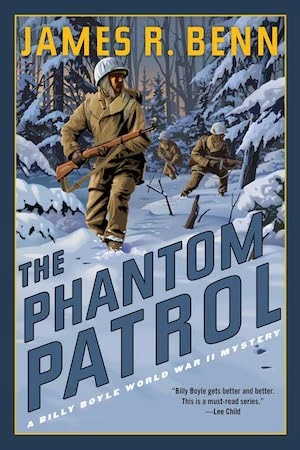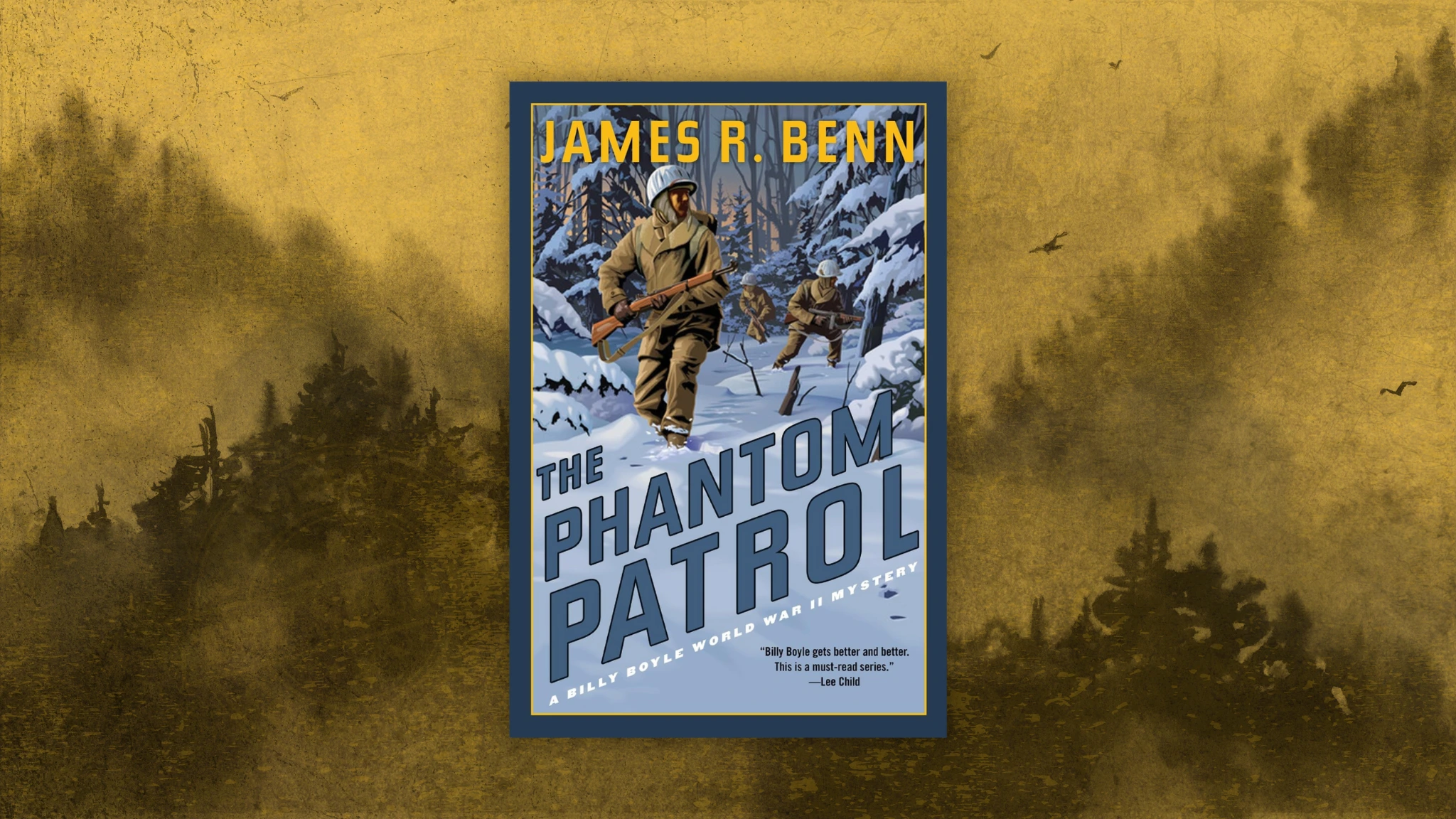The Phantom Patrol by James R. Benn
James R. Benn returns with an action-packed addition to his best-selling WWII-based Billy Boyle mystery series with The Phantom Patrol. The Boston native ex-cop detective returns as investigator and crime solver assigned to “Uncle Ike’s” staff. His distant cousin is General Dwight David Eisenhower, the Supreme Commander of the Allied Expeditionary Force.
The novel takes place in Paris and the Ardennes Forest during the winter of 1944. The French capital was liberated less than four months ago and the Battle of the Bulge, the last major German offensive, had just begun in this densely wooded area bordering Northeast France, Belgium and Luxembourg. The 200,000 strong German troops were moved in great secrecy to this 50 by 70 mile zone. Six weeks of brutal skirmishes left staggeringly high casualties on both sides finally resulting in the Nazi retreat in defeat.
The author prefaces the novel with a quote from J.D. Salinger’s short story The Stranger published in the December 1, 1945 issue of Collier’s in which the protagonist dispels the Hollywood myth of a soldier’s noble death.
“Don’t let any civilian leave you, when the story’s over, with any comfortable lies. Shoot down all the lies. Don’t let Vincent’s girl think that Vincent asked for a cigarette before he died. Don’t let her think he grinned gamely, or said a few choice last words. Those things didn’t happen.”
Jerome David (J.D.) Salinger plays a significant role in The Phantom Patrol. At the beginning of WWII, Salinger was already writing short stories with little success in getting them published. His family was of Lithuanian Jewish descent and this well-educated young man spoke fluent French and German. In 1942, at the age of 23, he was drafted into the U.S. Army and assigned as a special agent with the Counter Intelligence Corps, 4th Infantry Division, working closely with “The Ritchie Boys.” He participated in active combat on D-Day at Utah Beach, in the Battle of the Bulge and three other major campaigns. These experiences, combined with his participation in the liberation of one of the sub camps of Dachau Concentration Camp, eventually resulted in several weeks’ hospitalization for combat stress fatigue after the defeat of Germany.
The author characteristically and deftly blends fiction with historically accurate facts, heightening realism and suspense while sprinkling the text with well-known personalities whose own military adventures coincide with the times and places he writes about in each mystery. The title The Phantom Patrol references both the same-named real and fictional reconnaissance unit, the GHQ Liaison Regiment of the British Army “phantom patrols” who provided information from the front lines to the highest levels of both the British and American Forces. These intelligence officers possess top level security clearances and patrol in radio-equipped jeeps and motorcycles with one patrol unit for each division. This effective network had been established by British General Bernard Law Montgomery and subsequently adopted by American General Omar Bradley.
Billy Boyle is once again working closely with Kaz, his best friend and comrade-in-arms, Lieutenant (and Baron) Piotr Augustus Kazimierz, a member of Poland’s government in exile and translator on General Eisenhower’s staff. The novel kicks off in earnest when Captain Boyle finds a rare Albrecht Dürer drawing in the room of a dead informant after a late-night shoot-out at the Père Lachaise Cemetery. They were too late to capture thieves in the act of retrieving stolen art hidden in a crypt, but on time for bullets to fly.
Billy and Kaz brought the drawing to Rose Valland to identify. Rose was already working with the Monuments Men to locate and return Nazi looted art and cultural artifacts to their rightful owners. The MFAA, (Monuments, Fine Arts and Archives) program was created under the Civil Affairs and Military Government Sections of the Allied Armies to protect cultural property in the war zones.
Rose Valland was an actual heroine of the French Resistance who was in place as the temporary curator at the Jeu de Paume when France surrendered to Germany and remained throughout the German occupation. The museum was used by the Nazis as a transport center and warehouse for their widespread looting of great works of art stolen from predominantly Jewish collectors and dealers as well as museum pieces. This quiet, unassuming woman concealed her knowledge of German which enabled her eavesdropping and kept meticulous notes on the works and the destinations of shipments of the artworks. Had she been discovered, she would have been executed.
Rose witnessed the frequent “shopping” trips of Hermann Göring who selected works for a planned Führermuseum to be built post-war in Austria and more importantly, his personal collection. In 1945, Rose was commissioned as a Captain in the French Army. Postwar, she was highly decorated by several nations for her tireless efforts to expedite the restitution process of returning these works to their rightful owners.
The fictional central premise of The Phantom Patrol is that the “Syndicat du Renard” (syndicate headed by the mysterious, elusive man known as The Fox), a network of German operatives, primarily SS men who have remained behind in Paris, infiltrating the criminal sector continuing to steal and divert art masterworks before they are recovered. They work with renegade former Vichy police officers now with the Free French police force who retain their fascist/anti-Jewish leanings and have likely also infiltrated British intelligence.
Two of the men shot in the city bore tell-tale small tattoos indicating their blood type above their elbow betraying their membership in The Schutzstaffel (SS). Billy Boyle and Kaz are tasked to eliminate the Syndicate. They report to Col. Sam Harding (Billy’s boss at Supreme Headquarters) who is now heading up the OSS (Office of Special Investigations). After a briefing with General Eisenhower, our heroes will be deployed from Paris to Brussels to General Montgomery’s Headquarters. Their cover story task is that they are to learn the methodology of the Phantom Patrols in order to train General Patton’s Third Army.
Once on-site, their briefing officer is none other than the dashing movie star David Niven. He returned to England after making film love to Olivia deHavilland at the outbreak of war with Germany to re-enlist. Benn describes Major Niven as an experienced Veteran who trained with the Commandos, led a Phantom patrol and since the Normandy invasion had been a member of General Montgomery’s intelligence staff. Separating fact from invention is purely speculative as Major Niven was a key member of the General’s staff but steadfastly kept his military service secret upon his return to Hollywood. The handsome man was down-to-earth, efficient in his job and entertained Billy and Kaz with witty stories about the film industry over a sumptuous dinner.
Like Sergeant Salinger, Major Niven also has a perilous and meaty role to play in this work of fiction. He accompanies the men into the field in the vicinity of the Ardennes Forest where the action heats up in a nasty firefight with some German troops. Before The Phantom Patrol comes to a conclusion, there are many combat engagements as the Battle of the Bulge rages on. The trail of the network of art thieves is fraught with danger on and off the battlefield.
Benn veritably places the reader on the battlefield, in the situation room and in the thick of World War II. His engaging style and historical accuracy are sure to satisfy history buffs and mystery readers alike. He has written another engaging rapid-fire yarn with a little romance tossed in for good measure. New readers or fans since the outset of the series will be pleased with his work as each novel can stand independently.
RELATED POSTS:
Riveting, Realistic WWII-Era Mystery Featuring a Yankee in Great Britain


Publish Date: 9/24/2024
Genre: Historical Fiction, Thrillers
Author: James R. Benn
Page Count: 352 pages
Publisher: Soho Crime
ISBN: 9781641295437
Read the original article here



